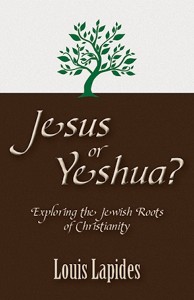Jun 20, 2012
Posted by Scripture Solutions on Jun 20, 2012 | Comments Off on Just Published! Jesus or Yeshua: Exploring the Jewish Roots of Christianity
Today ScriptureSolutions published a new booklet written by Louis Lapides. This brief book can be found for Kindle at Amazon.

Jesus or Yeshua: Exploring the Jewish Roots of Christianity by Louis Lapides
It came to no surprise to me that when I first became a Jewish follower of Yeshua, I was going to have a cultural crisis trying to fit into a Gentile Church. I lasted a few months before I started asking inevitable questions, “I’m Jewish. Jesus is Jewish. His first followers were Jewish. The New Testament was written by Jews and a lot of the concepts they discussed have a powerful Hebraic background. Then why is Christianity so “not-Jewish”?
Jesus or Yeshua: Exploring the Jewish Roots of Christianity provides the reader with some of the findings I came upon as searched for answers to my questions. For me a lot of the issues were resolved when I studied the origin of most of the terminology used by Christians when describing their beliefs and practices. When I was growing up attending Hebrew school in preparation for my Bar Mitzvah I never expected that Rabbi Printz would tell me that the mass practiced by the Catholic Church across the street from our temple was actually based in the Jewish Passover. Nor was I told that baptism has it’s origins in the Jewish practice of immersion or mikveh used when Gentiles would turn from their paganism and convert to Judaism.
Attending a church for me at age 23 was a shocker as I describe in my opening chapter. Here is a sample section from that chapter that will give you an idea of what Jesus or Yeshua: Exploring the Jewish Roots of Christianity is all about.
Here’s a shocker . . . Jewish people don’t feel at ease in a Christian church. The first time I attended a Protestant congregation, a Southern Baptist one, I couldn’t avert my eyes from the 10-foot tall stained glass mosaic of Jesus looming behind the pastor. I imagined for a few moments the man from Galilee was about to step out of the window, float over to my pew and ask whether I noticed the “Jews Not Welcome” sign at the church’s front door. “Of course,” I would respond, “But Jesus, aren’t you . . . .?”
(more…)
Dec 6, 2011
Posted by Scripture Solutions on Dec 6, 2011 | Comments Off on Wondering What Happened at the Cross?
The wearing of the cross by celebrities and their imitators as seen in tattoos and jewelry has created too much of a familiarity with the instrument upon which Jesus died. In Pastor Rob Bell’s book Love Wins, his aim in chapter five is to sift through the familiarity of the cross and get to the truth about what took place when Jesus died. With this goal in mind, I am in complete agreement.
As Bell lists the various perspectives on the cross, once again the Love Wins author gravitates to a position of uncertainty. He wants to make the results of Jesus’ death an “either/or” situation. Once again Bell takes a giant leap from traditional Christianity and invents as emergent church godfather Brian McLaren calls, ” a new kind of Christianity.”
The Cross Speaks of the Sacrifice Jesus Made On Our Behalf
First, the author speaks of the death of Jesus by which the Messiah paid for our sins much like the sacrifices in the Old Testament (pg. 123). He quotes from Hebrews 9:26 which claims Jesus appeared “once for all at the end of the ages to put away sin by the sacrifice of Himself.”

Bell compares the sacrifice of Jesus to other cultures where worshippers offered sacrifices to appease the gods or forces in order to maintain a peaceful, favorable relationship with them. How odd! Jesus did not die to put an end to pagan sacrifices or simply to please a whimsical, vengeful. Yet Bell says, “Whole cultures centered around keeping the gods pleased. . . . And now the writer [of Hebrews] is announcing that those days are over because of Jesus dying on the cross” (pp.124-125).
The problem with Bell’s view of the substitutionary death of Christ is that he forgets Jesus was fulfilling and putting an end to the Jewish sacrificial system as described in the Torah books of Leviticus and Numbers. Jesus was not dying to appease the gods of the Greeks or Romans.
The Cross Signifies the Reconciliation Between God and Man
The next meaning of Jesus dying on the cross has to do with reconciliation . In Colossians 1:20 Paul taught, ” and through Him [Jesus] to reconcile all things to Himself, having made peace through the blood of His cross; through Him, I say, whether things on earth or things in heaven”. Reconciliation, according to Bell, has to do with bringing two people together who were estranged and now they found a way to work it out and come back together in a new relationship. (pg. 125).
Here is where you have to watch the craftiness of Pastor Bell. He says on pg. 126 when Jesus died, He made peace “with all things.” You can bet your last dollar Bell will take those words to a place Paul had no intention for the phrase to go. The application of the reconciling work of Jesus to “all things” will be discussed further. (more…)








